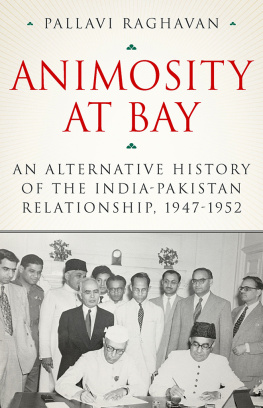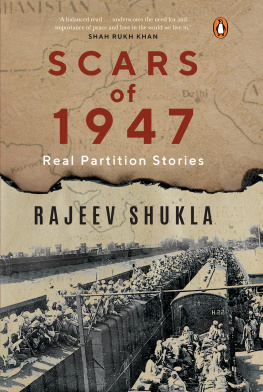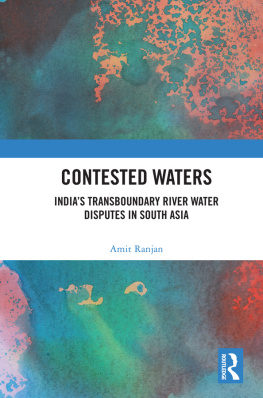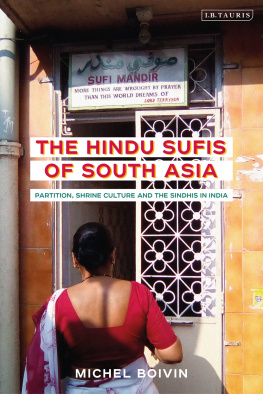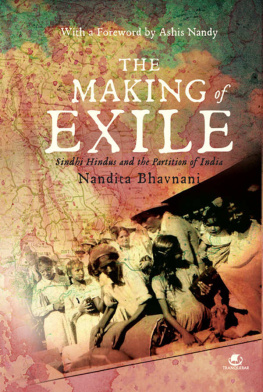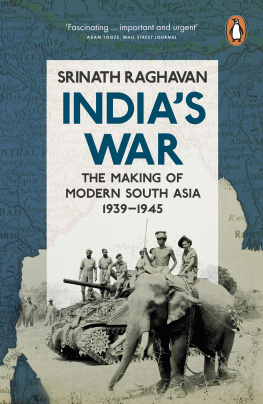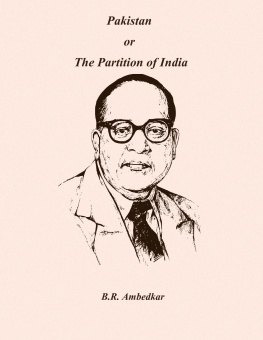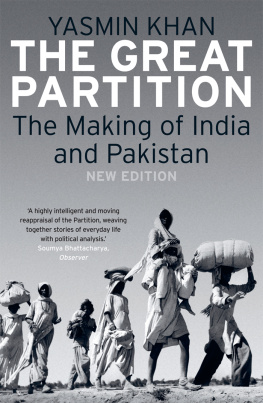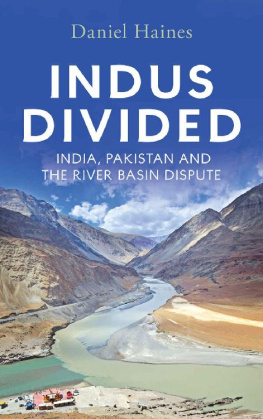ANIMOSITY AT BAY
PALLAVI RAGHAVAN
Animosity at Bay
An Alternative History of the IndiaPakistan Relationship, 19471952


Oxford University Press is a department of the University of Oxford. It furthers the Universitys objective of excellence in research, scholarship, and education by publishing worldwide.
Oxford New York
AucklandCape TownDar es SalaamHong KongKarachi
Kuala Lumpur MadridMelbourneMexico CityNairobi
New DelhiShanghaiTaipeiToronto
With offices in
ArgentinaAustriaBrazilChileCzechRepublic FranceGreeceGuatemalaHungaryItalyJapanPolandPortugalSingaporeSouth KoreaSwitzerlandThailandTurkeyUkraineVietnam
Oxford is a registered trade mark of Oxford University Press in the UK and certain other countries.
Published in the United States of America
by Oxford University Press
198 Madison Avenue, New York, NY 10016
Copyright Pallavi Raghavan, 2020
All rights reserved. No part of this publication may be reproduced, stored in a retrieval system, or transmitted, in any form or by any means, without the prior permission in writing of Oxford University Press, or as expressly permitted by law, by license, or under terms agreed with the appropriate reproduction rights organization. Inquiries concerning reproduction outside the scope of the above should be sent to the Rights Department, Oxford University Press, at the address above.
You must not circulate this work in any other form and you must impose this same condition on any acquirer.
Library of Congress Cataloging-in-Publication Data is available
ISBN: 9780190087579
ISBN: 9780197530948 (e-book)
Printed in India
My parents,
TCA Raghavan and Ranjana Sengupta,
and sister, Antara Raghavan,
are the truest owners of this book.
CONTENTS
BL British Library
MEA Ministry of External Affairs (Government of India)
NAI National Archives of India, New Delhi
PRO Public Records Office, UK
Those who are familiar with this project, will know that it went through several stagesboth in its writing as well as non-writing. It evolved as a manuscript-in-waiting at the Centre for Policy Research in New Delhi, as well as an almost-there manuscript at Jindal University and Ashoka University. Each of these institutions was important in the shaping of this work, because they enabled interactions with individuals who pushed me into writing a stronger, and more rigorously argued, book.
My supervisor at Cambridge, Prof. Joya Chatterji, indelibly shaped my understanding of the discipline of history, and equipped me for life to navigate the world with an invaluable set of intellectual tools. Joyas insistence on attention to a closely crafted historical analysis, based on empirical research, as well as carefully rounded and historicised interrogation of the archival material, have immeasurably added to the strengths of this bookthough all its shortfalls are, obviously, mine alone. In addition, I would also like to thank Dr. David Washbrook, and Prof. Sumantra Bose for their close reading of the thesis, as well as their subsequent encouragement. I am also grateful to the Cambridge Trusts and the Nehru Cambridge Scholarship for funding my PhD research.
The evolution of the project from a PhD dissertation to a study of Indias early bilateral relations with Pakistan could not have found a better mentor than Srinath Raghavan, whose generosity with intellectual support, when coupled with a phenomenal patience over what now seems like a remarkably prolonged gestation, have greatly enriched the substance and depth of the arguments in the book. These have also benefitted hugely from my interactions with fellow scholars of Nehrus world and modern Indias international historyan exciting, and newly resurgent field of study.
In particular, I would also like to thank Mahesh Rangarajan and Pratap Bhanu Mehta, for their inputs at various stages of the manuscript, as well as for acting as entry points into scholarly communities where the ideas and arguments of the manuscript could be further tested and strengthened. The circles they introduced me into, moreover, of researchers from different fields engaged in questions about Indias Cold War, the process of the shaping of international relations, as well as state-making in India and Pakistan during the 1950s, have also contributed enormously to my understanding of this field.
Delhis historian circle consists, I think, of some of the loveliest people in the whole worldI have loved interacting with them, and benefitted enormously from their bracing concern with the adherence to the requirements of the discipline, alongside an equally important engagement with the question of how our toils can also enable a more large-hearted, humane and compassionate world around us. In particular, I would also like to thank the JGU Historians Groupits accredited, card carrying members, as well as those for whom, on occasion, we deigned to make honourable exceptions. They provided the support system that a close-knit community of scholars can bring for dragging a book across the finishing line, along with consistently useful insights about how the chapters in the manuscript could be further developed.
This book has also been written while in the companionship of fellow travellers, who will know who they are, and whose friendship I have treasured. I want to express my deepest gratitude to them for this, along with the hope that they will enjoy reading the subsequent pages.
I am also hugely indebted to Michael Dwyer and the team at Hurst, who have shepherded this book through production while displaying amazing fortitude and professionalism. The book has been hugely improved as a consequence of their efforts, and I have greatly enjoyed working with them during the finalisation of the manuscript. I will always be grateful for their diligence, as well as kindness to a first-time author.
An over-wrought despatch from the Indian mission in Lahore in 1948 had concluded: There are no parallels anywhere to the nature of the diplomatic relations subsisting between India and Pakistan, or to the type of system evolved for conducting these relations. The writer, M. K. Kripalani, the deputy high commissioner of India in 1948, was referring to the bewilderingly manifold nature of the tasks that the Indian High Commission in Pakistan confronted. These related not only to defence, or security or intelligence gathering, but covered rather just about all aspects of life: who lived where, who could marry whom, where they could travel, what they could own, and how they could meet their parents. Nowhere else in the world, Kripalani continued, would the staff of a High Commission be called upon to perform as many different sets of tasks, as those in the offices of the Indian High Commission in Karachi and Lahore.
But this statement also strikes one as curious, given the subsequent characterisation of the IndiaPakistan relationship as one of high stakes brinkmanship and a volatile and all-consuming strategic rivalry for territory. Given this kind of characterisationof a high stakes security game, based on a zero-sum rivalrythe writer seemed to be painting a slightly different picture: pointing to a far more wide-ranging and deeply ingrained set of problems than could be mastered by pinning down the mechanics of winning a geopolitical game. It seems incongruous that the writer, in 1948, rather than speculating, say, on the preparedness of the armies for a war in Kashmir between India and Pakistan, should have been lamenting the burden of the weight of the diversity of administrative responsibilities his office had to bear.

